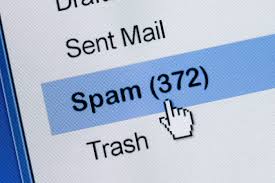Email spam or Spam emails is any kind of unwanted, unsolicited, virus-infested digital communication sent out in bulk to individual mailboxes. With no spam filter or security measures in place, the emails will always land in your mailbox.
1. So how does email spam impact your business?
Spam remains a serious problem for businesses and costs more than you think. Some businesses may dramatically underestimate the impact spam and junk mail has on their business. However, spam emails are costing businesses around the world billions of dollars in lost productivity, security breaches, and other issues. Let’s take a look at the negative impacts of spam on businesses.
i. Email spam may contain viruses and malware (loss of productivity, financial loss, reputation risk)
The true danger of spam lies in the spoofed emails, viruses, and malware that it delivers.
Gone are the days when spam emails were merely annoying. It is no longer just random electronic junk mails. In present times, spam has grown into an aggressive threat for businesses. Unlike yesteryears, spammers now have access to more sophisticated attack tools and their methods that are continuously evolving. They have become more creative in their tactics to get their messages into your inboxes.
Hackers now send cleverly disguised emails to you that contain malware or viruses. Once in a while, spam can be so convincing that only an expert would be able to visually identify it. Once this kind of spam has been clicked by an employee, there is a high risk that it will infect your computer system (virus). Viruses are programmed to do a variety of harm including damage programs, delete files or even format a hard drive. The effects for you or your employees would be:
- Degraded computer performance owing to sapped computer memory
- Erratic computer behavior (frustrating!)
- Unexplained data loss
- Frequent computer crashes (recovery may be expensive and time consuming!)
- Viruses targeting organizations are usually programmed to replicate themselves or flood the network with traffic, making it impossible to perform internet activity.
Any of these effects on users’ work computers is bound to lead to a significant waste of time and in turn employee productivity. As a result, businesses may be forced to allocate resources for restoring systems, preventing further damage, and recovering or securing compromised employee or customer data.
ii. Phishing attacks/spoofing (reputation risk, financial loss, data loss)
Phishing is a method of trying to gather personal information using deceptive emails and sites. It is the most common type of social engineering attack on the internet. Here, cybercriminals/attackers masquerade as a trusted source to fool you into handing over your data. This could be personal data or business data. In other words, the attackers are “fishing for information” hence the name.
With a spoofed email, an attacker disguises as a legitimate email sender – a person or organization familiar to the victim. In the case of a spoofed organization name, the attackers use this to send malicious emails to targets. This kind of attack has the potential to cause great damage to an organization’s reputation especially if the victims are customers.
Successful phishing attacks can also cause financial loss to employees or put employees’ personal information at risk. More often than not, though, those behind phishing attacks aren’t trying to steal money from organization, rather they are attempting to steal something much more valuable: data. When phishing attacks successfully trigger data breaches, the consequences for businesses can be severe.
Example:
You receive an email about your annual tax returns when it appears to be tax season. You think nothing of it and open it. It says you need to verify your details. Okay, plausible. You click the link to update online, or you open the alleged form that needs filling. Too late!
Clicking on these links or downloading these attachments allows malware onto your computer. This malware is designed to steal more information from you.
Phishing or spoofed emails are designed to appear as though they originate from a legitimate source so that you open it. It could be your bank, your medical insurer, your car insurer, your hospital, etc. They often ask for information such as ID number, login details, payment details, bank details and other identifying information. The aim is to ultimately infiltrate the organization.
iii. Email spam may contain ransomware (data loss, reputation risk, financial loss)
Ransomware is a type of malicious software that infects a computer and restricts users’ access to the files and data. The attacker then demands a ransom (yes!) from the victim to restore access to the data upon payment. Once the ransom is paid, the attacker unlocks the files.
A common delivery system for ransomware is phishing spam emails. An attachment comes through to an employee’s mailbox, masquerading as a file they should trust. Once they’re downloaded and opened, they can take over the victim’s computer and/or data therein.
“In 2019, multinational manufacturers and US city and county governments spent more than $176 million responding to the biggest ransomware attacks of 2019, spending on everything from rebuilding networks and restoring backups to paying the hackers ransom to get their files back.” CRN NEWS
Some organizations are more attractive targets for attackers because they appear more likely to pay ransom quickly—for example, government agencies or medical facilities who may need immediate access to their files. Law firms with sensitive data may also be wearier about keeping the news of compromise quiet and hence more likely to give in to ransom requests. However, it is still important to note that some ransomware spreads automatically and indiscriminately across the internet.
vi. Email spam slows down your internal network (operational loss)
Junk mail takes a toll on businesses by stressing network bandwidth to the limits. Junk mail is a drain on company resources and an unproductive use of bandwidth.
v. Lost productivity hours (financial loss, operational loss)
Employees at any level receiving and having to pause, scrutinize and work through spam and other types of junk mail every single day over time accumulates into hours of lost productivity for your employees and in turn, your company’s bottom line. If you and your employees are manually clearing out spam email messages, this cumulatively translates to countless lost manhours that would be better spent focusing on your core business operations instead.
If it takes an employee 4 seconds to open, identify and delete a spam mail, an organization with 400 employees that receives 10 spam messages per employee per day will lose 48 days of work a year that can be directly attributed to spam.
vi. Email spam wastes company resources (financial loss)
Aside from productivity loss, email spam costs your company money in terms of the additional burden it exerts on your computer systems. Email spam takes up a lot of memory space. Your business is continually having to buy additional space for your servers to store data that is ultimately useless.
vii. Important emails missed (financial loss, reputational loss)
Employees are also more likely to miss an important email either because it arrived at the same time when a spam email was coming in and therefore, they missed it or because they became overwhelmed with numerous emails (most of which were spam).
From an employee level to the enterprise level, the cost of email spam is significant and warrants attention because the risk of spam is not going away any time soon.
In today’s world, spam filtering is a must-have feature to protect your business from data loss, financial loss, operational loss, and reputational loss that may result in the unfortunate event that these scenarios unfold in your business network.
2. So how can spam filtering save your business?
Spam filtering ( antispam) detects unsolicited, unwanted, and virus-infested email (called spam) and stops it from getting into your employees’ mailboxes. Spam filters are applied to both inbound emails (emails destined for your network) and outbound emails (emails leaving your network). Because of the continuously evolving social and technological advances by spammers in sending out spam emails, spam filtering solutions must be continuously updated to address this evolving threat.
i. Protecting against threats
Antispams help to block spam (phishing emails, viruses, malware) from reaching your network and effectively your employees’ mailboxes. They do this by dissecting the email to determine whether it is genuine or not. Once a threat (virus, malware, spoofing) has been detected, it is automatically captured up and either held securely in quarantine or deleted instantly.
ii. Filtering legitimate emails
Genuine emails need to stand out and avoid being mistaken for spam or junk mail. Antispam filters use sophisticated recognition capabilities which will only block spam but allow genuine emails to be delivered to employee mailboxes. This significantly reduces the risk that you will miss out on that important business email.
Filtering has come a long way in recent years with complex algorithms in identifying spam before it becomes a risk to any business. Real emails can now also pass through safely, minimizing the frequency of the FAQ, “Have you checked your spam or junk mail folder?” Businesses can, therefore, work with greater productivity. You need emails, but certainly not spam or the disaster it may bring to your business.
iii. Protecting your business reputation
A secure email account is one of the most valuable parts of running a successful business today. You want to be sure that your email is as secure as possible and that your client’s information will remain safe.
One email has can very easily take down a large corporation. There are few other things that would make a CEO squirm more than having to hold a press conference to admit a breach of company data, an acknowledgment that you failed to protect your customers’ data. You not only have to worry about financial loss but reputation and perhaps even potential lawsuits! Investing in reliable antispam is a small price to pay to ensure this does not happen to you or your CEO.
iv. Help you meet data regulations
Some businesses are subjected to certain privacy and data storage requirements, some more stringent than others. These often include always using spam filtering to reduce risk of data breach, loss, or compromise.
It should be common practice for all businesses to invest heavily in their online security to protect and safeguard them from the negative impacts of having spam emails.
Want to bolster your email security and gain advantage over spammers and cybercriminals? Try MailSafi Email Security. You can register for our Free Trial. MailSafi’s spam filtering service will help your business dramatically reduce the amount of spam your company receives and subsequently reduce your costs and the risks associated with spam. We will bolster your protection against phishing attacks and spoofing.
Most customers see a return on their investment in just a matter of days!
MailSafi Email Security can be integrated and works seamlessly with different email platforms including Microsoft /Office 365, MDaemon, Microsoft Exchange Server, Zimbra, Postfix, and shared hosting platforms.
Try MailSafi! Contact us for more information.
![]()





Pingback: The Cost of Internal Email Spam to Businesses » The MailSafi Blog
Pingback: Why You Should Outsource Your Spam Filtering » The MailSafi Blog
Pingback: Microsoft 365 + MailSafi Email Basic Hybrid | MailSafi [2020]
Pingback: Compromised email account: How to fix it | MailSafi
Pingback: Google Workspace + MailSafi Email Hybrid | MailSafi [2020]
Pingback: Email Hybrid: MailSafi Basic + MailSafi Enterprise | MailSafi
Pingback: Why Even the Best Email Filter Cannot Guarantee 100% Protection
Pingback: 15 Must-Have Features For Your Spam Filtering Service » The MailSafi Blog